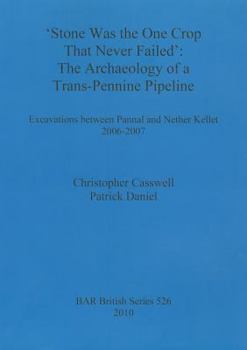'Stone was the one crop that never failed': The archaeology of a trans-Pennine pipeline: Excavations between Pannal and Nether Kellet 2006-2007
In 2006 and 2007, a 94km-long gas pipeline was excavated across the Pennines, from Pannal in North Yorkshire, to Nether Kellet in Lancashire (N/W England). Around twenty archaeological excavations were undertaken to mitigate the impact of the construction of the pipeline on the archaeology of the route, and these form the subject of this volume. The excavated remains were generally slight and were widely scattered along the route; the range of periods they represent is equally broad and intermittent. The earliest recorded evidence was a Mesolithic flint scatter from Ribblesdale. Bronze Age activity was represented by ringworks, burnt mounds and rock art, with an apparent concentration on the Craven lowlands during this period. The prehistoric remains seem to reveal a low and shifting population, more concerned with monumentality and remembering than with settlement and land division. Very few traces of activity attributable to the 1st millennium BC were encountered. Romano-British remains were surprisingly sparse considering the military infrastructure and transport network inserted into the region at this time. The pattern of slight and transient land use with low levels of material culture, established in prehistory, appears to have been an enduring characteristic of the area. The excavations along the Pannal to Nether Kellet pipeline have undoubtedly helped to characterise the archaeological resource of the Pennine river valleys through which it passed, and have refined the understanding of the distribution and chronology of various activities and site types across a range of time periods. Some questions have been answered, and many new ones framed. These sites now exist as a comparator for future work, both in the local area and nationally.
Format:Paperback
Language:English
ISBN:1407307398
ISBN13:9781407307398
Release Date:April 2011
Publisher:British Archaeological Reports Oxford Ltd
Length:190 Pages
Weight:1.55 lbs.
Dimensions:0.4" x 8.2" x 11.6"
Customer Reviews
0 rating





